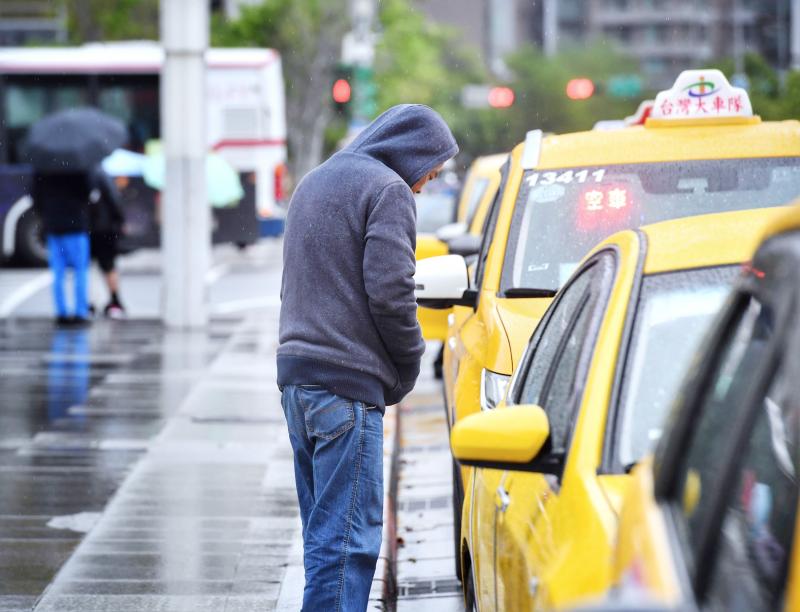Even with more than NT$450 billion (US$14.85 billion) in financial aid from the Executive Yuan’s expanded relief package, local tourism-related businesses are unlikely to rebound from the COVID-19 pandemic any time soon, a central bank report released last month said.
The NT$1.05 trillion relief package includes NT$472 billion in financial assistance for tourism and transportation sectors, such as airlines, hotels, travel agencies, taxis and tour buses.
However, a March 20 central bank report said that the effects of the COVID-19 pandemic on global and domestic economies are far greater than that of the 2002-2003 SARS epidemic, despite any benefits from delayed purchases after the crisis ends.

Photo: CNA
Tourism-related industries would be hardest hit, with widespread travel restrictions and bans on mass gatherings imposed by governments worldwide.
“It is difficult to say that there will be a V-shaped recovery at the moment, as it all depends on the development of the pandemic,” the report said.
Taking the SARS epidemic that broke out in late 2002 as an example, the bank said that the local economy rapidly lost momentum in the second quarter of 2003 after the disease took its toll on global activity.
Over that three-month period, travel on international flights to and from Taiwan fell 69.5 percent and the nation’s economy contracted 1.15 percent in 2003 as a result of the knock-on effects of SARS, the bank said, adding that the effects of COVID-19 are more severe.
Passenger load factors in February on routes between Taiwan and China, Hong Kong and Macau fell by more than 90 percent, compared with their levels in December last year, the report said, citing Tourism Bureau statistics.
At the same time, taxi drivers had 30 percent fewer passengers, while tour bus operators also experienced a 17.2 percent decline in daily operations from January, the report said.
The central bank said that the restaurant and beverage sector typically has the highest GDP ratio from the tourism industry, while tour agencies, hotels, and car rental and air transportation companies also earn a noticeable portion of their incomes from it.
Therefore, as domestic and foreign tourists’ travel activities stagnate in Taiwan, tourism-related businesses would face greater difficulties, the bank said.
Due to Taiwanese’s strong interest in traveling abroad, coupled with Beijing’s ban on independent tourists to Taiwan from Aug. 1 last year, Taiwan registered travel deficits of US$6.1 billion last year, a new high, central bank data showed.
However, the travel deficits would likely shrink this year, because of COVID-19, the bank said.

South Korea’s equity benchmark yesterday crossed a new milestone just a month after surpassing the once-unthinkable 5,000 mark as surging global memory demand powers the country’s biggest chipmakers. The KOSPI advanced as much as 2.6 percent to a record 6,123, with Samsung Electronics Co and SK Hynix Inc each gaining more than 2 percent. With the benchmark now up 45 percent this year, South Korea’s stock market capitalization has also moved past France’s, following last month’s overtaking of Germany’s. Long overlooked by foreign funds, despite being undervalued, South Korean stocks have now emerged as clear winners in the global market. The so-called “artificial intelligence

‘SEISMIC SHIFT’: The researcher forecast there would be about 1.1 billion mobile shipments this year, down from 1.26 billion the prior year and erasing years of gains The global smartphone market is expected to contract 12.9 percent this year due to the unprecedented memorychip shortage, marking “a crisis like no other,” researcher International Data Corp (IDC) said. The new forecast, a dramatic revision down from earlier estimates, gives the latest accounting of the ongoing memory crunch that is affecting every corner of the electronics industry. The demand for advanced memory to power artificial intelligence (AI) tasks has drained global supply until well into next year and jeopardizes the business model of many smartphone makers. IDC forecast about 1.1 billion mobile shipments this year, down from 1.26 billion the prior

NEW IDENTITY: Known for its software, India has expanded into hardware, with its semiconductor industry growing from US$38bn in 2023 to US$45bn to US$50bn India on Saturday inaugurated its first semiconductor assembly and test facility, a milestone in the government’s push to reduce dependence on foreign chipmakers and stake a claim in a sector dominated by China. Indian Prime Minister Narendra Modi opened US firm Micron Technology Inc’s semiconductor assembly, test and packaging unit in his home state of Gujarat, hailing the “dawn of a new era” for India’s technology ambitions. “When young Indians look back in the future, they will see this decade as the turning point in our tech future,” Modi told the event, which was broadcast on his YouTube channel. The plant would convert

People stand in a Pokemon store in Tokyo on Thursday. One of the world highest-grossing franchises is celebrated its 30th anniversary yesterday.